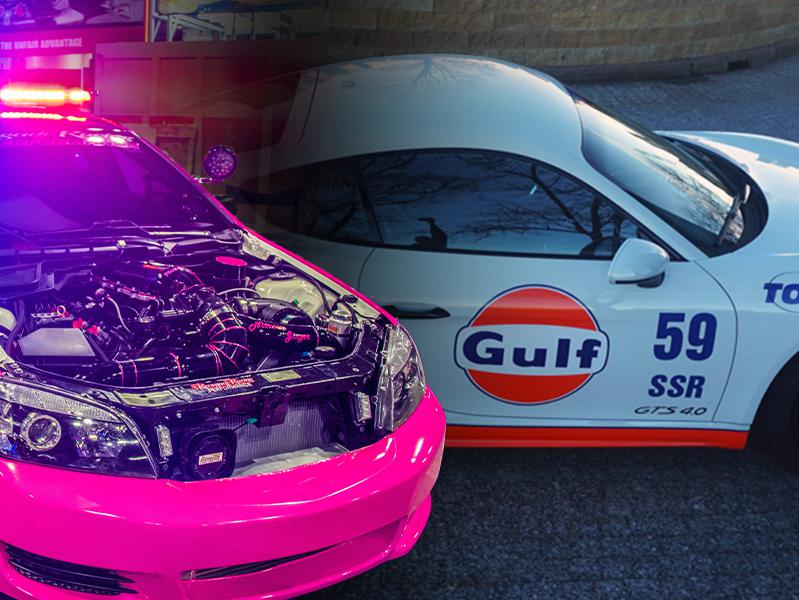Problem Solvers

Safety and safety awareness are regular topics during team meetings at MAHLE Motorsport, where management welcomes and often acts on employees’ suggestions for improvement.
By following several simple and easy-to-implement best practices, this race parts manufacturer has avoided workplace accidents for more than four years.
The Problem: Workplace accidents cost US businesses billions of dollars each year.
The Solution: Prevent injuries and downtime by implementing smart and effective safety practices.
Running a race team, a machine shop or repair facility comes with known risks. Anyone who has worked in a shop—or on cars in general—has stories to tell, and maybe a scar from a power tool that got away, a welding project that got a little too hot, or some other accident that caught them off guard. As we’ve all experienced, “@$#! happens.”
But the reality of shop safety is that @$#! doesn’t have to happen. As a matter of fact, @$#! can be successfully avoided if you take the right approach to safety.

The MAHLE Motorsport North America team (makers of world-class racing pistons and other components) has an excellent safety record. And Plant Manager Brad Green recently spoke with us about how they’ve managed to effectively ward off workplace mishaps at MAHLE facilities in Morristown, Tennessee, and Fletcher, North Carolina.
“We’re a big manufacturing facility—hundreds of people are here on-site and our other plant—and the Motorsports Group hasn’t had a single lost-time incident in over four years,” said Green without a hint of sanctimonious pride. “Our approach is really simple, and our success comes from everybody being aware of what’s going on around them all the time.”
Think about it: That many workers going more than 1,000 days without so much as a repetitive stress strain. So what’s the MAHLE team working to avoid? Basically, the types of accidents that the Occupational Safety & Health Administration (OSHA) ominously categorizes as The Fatal Four:
- Falls (either a person falling or something falling onto a person)
- Electrocution
- Struck By (something)
- Caught In Between (one thing and another thing)
Green’s team, and MAHLE management, embrace situational awareness as the key to plant safety. “We talk about being aware of safety and safety hazards at regular team meetings,” he explained, “but it goes beyond that. Managers and supervisors actually walk the shop floor. That lets us talk one-on-one about safety.”
Management at MAHLE puts a premium on safety, so much so that Green said employees are even on the lookout for potential problems outside the building and in the parking lot.
Green reinforced the point: “We really encourage people to look all around them. On the floor, around their workspace, above them, everywhere. In fact, during a shop floor conversation not long ago a machine operator mentioned that he had noticed a ceiling-mounted loud speaker didn’t look right. We brought in a scissor lift and discovered that it had come loose from its mount, and it could have fallen and potentially hurt somebody. This guy was aware of his surroundings, and that made a difference.”
Employees also are encouraged to speak up about machine repairs or additional safety equipment they need at regular team meetings or whenever a situation surfaces.
“Our team has even added safety equipment to machines that we buy because we have our own engineering staff that’s more than capable,” Green said. “For machines that we have to frequently load material into, instead of having a locked, fixed door for safety, we utilize light curtains. Let’s say somebody puts their hand through that light, it works like a safety stop for that machine.”
Green further noted that their group is looking at proximity sensors to monitor the areas around other machines. “There are a lot of different ideas out there that can impact safety,” he added.
While MAHLE’s shop floor safety dialogue and in-house safety engineering may seem informal, the company does have mandatory protocols in place for safety gear and daily machine safety checks, among others. For example, the E-Stop (emergency stop button) on every machine is tested at the beginning of every shift.
Green capped our conversation with one important point: “From the safety perspective, people think that if they stop the machine cycle, then the danger is gone. But you have to be cognizant that some machines have stored energy from stored air pressure or hydraulic pressure, and to truly make the machine safe—and to avoid OSHA’s Fatal Four—you have to consider the stored energy for a machine to be truly safe to work on.”
Altogether, these simple and easy-to-implement best practices represent concrete steps toward making any shop a workplace where @$#! doesn’t have to happen…anymore.
SOURCES
–
MAHLE Motorsport
us.mahle.com/en/motorsports/
 MEMBERSHIP LOGIN
MEMBERSHIP LOGIN JOIN PRI
JOIN PRI


